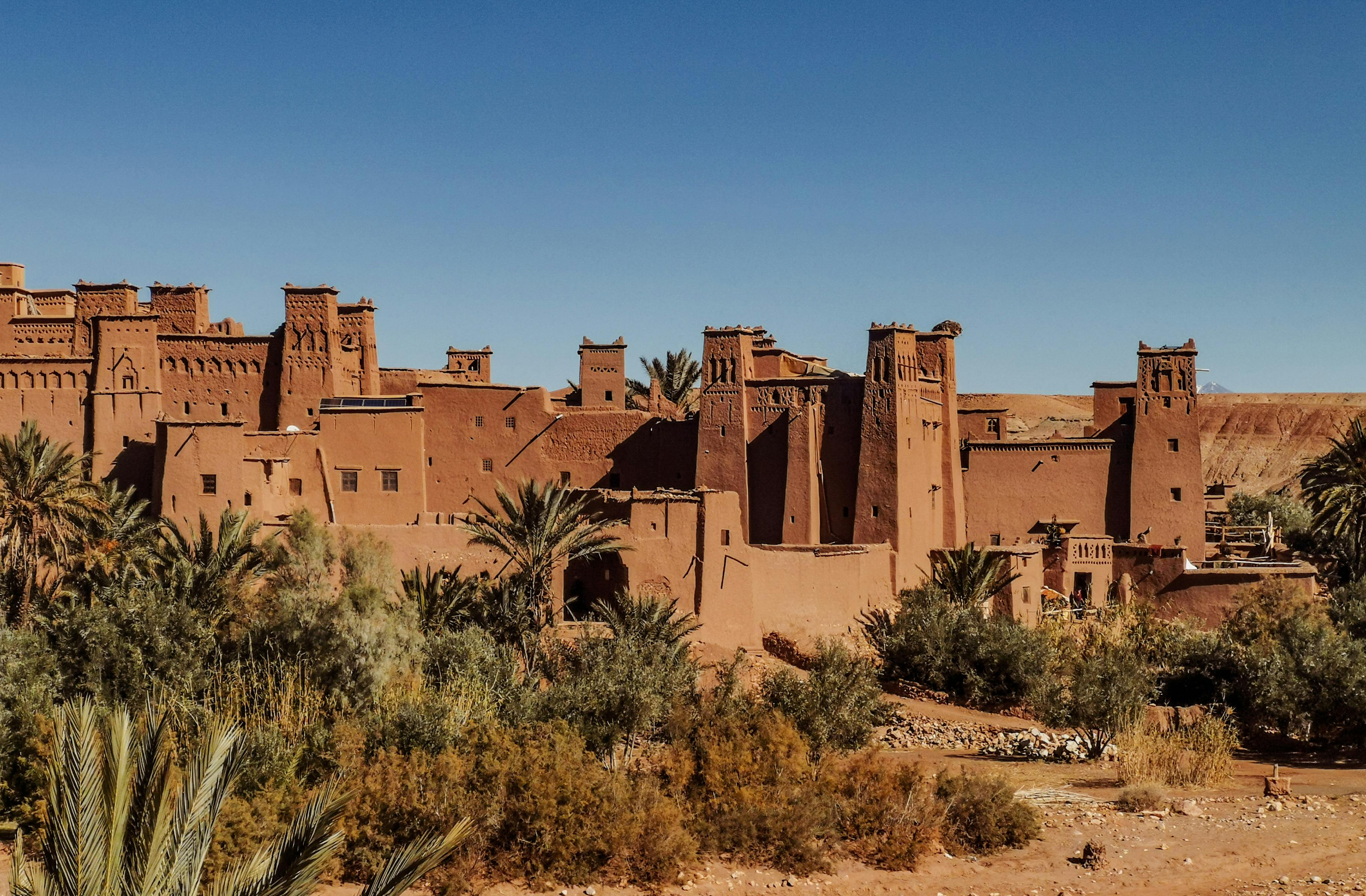
Kosova Today: Unveiling the Gateway to Kosovo's Vibrant Present
Kosova’s Tech Boom: How Startups Are Shaping the Future
Kosova Today's Tech Boom: How Startups Are Shaping the Future
In recent years, Kosova has experienced a remarkable expansion in its technology sector, leading to a vibrant and promising tech boom. This fascinating transformation is not only evident in the emergence of numerous startups but also in the overall socio-economic landscape of the country.
At the forefront of this journey stands Prishtina, the capital city, known for its dynamic and entrepreneurial spirit. The local ecosystem has witnessed a surge of innovative ideas and tech-driven initiatives, fostering an environment where startups can thrive. As a result, Prishtina has earned the reputation of being one of the major technology hubs across the Balkan region.
One key factor contributing to Kosova's tech boom is the growing population of young, ambitious, and skilled professionals. With a high percentage of young people in the country, there is an abundance of bright minds eager to contribute to the digital revolution. These individuals possess diverse skills ranging from software development and digital design to online marketing and business management.
Moreover, Kosova has witnessed significant investment in infrastructure and technology-related educational programs. This deliberate focus on nurturing technical skills has created a favorable environment for startups to emerge and flourish. Institutional support from both public and private entities, including government initiatives, venture capital funds, academic institutions, and mentorship networks, further facilitates the growth and success of these startups.
Many factors have catalyzed this technological advancement. First and foremost is the internet's transformative power, which has connected Kosovo's entrepreneurs with limitless opportunities worldwide. Building on this advantage, several local startups have leveraged emerging technologies like artificial intelligence (AI), blockchain, FinTech, e-commerce platforms, and software development to build scalable business models.
The agile and adaptive mindset prevailing among Kosovan startup founders plays a crucial role in shaping this future-forward landscape as well. Entrepreneurs embrace failure as part of their journey and demonstrate resilience while successfully navigating obstacles. They actively seek mentorship, engage in networking events, participate in hackathons, and collaborate with international partners to refine their technical expertise and expand their global knowledge.
The strong sense of community within the Kosovan startup ecosystem is worth highlighting. Startups often cooperate and support each other, creating a collaborative atmosphere rather than simply competing against one another. This culture has led to the establishment of coworking spaces, technology incubators, and accelerators that facilitate cross-pollination of ideas.
Undeniably, Kosova's tech boom affects not only the entrepreneurial landscape but also society at large. These startups are catalysts for economic growth, attracting investments, generating employment opportunities, and diversifying the local economy. Additionally, they fuel societal development by addressing pressing challenges through creative and impactful solutions.
In conclusion, the emergence of startups in Kosova has spearheaded an exciting tech boom that preludes a promising future. Through combining drive, innovation, strong support networks, and access to global markets, Kosovan entrepreneurs are shaping a new narrative for their country. The possibilities seem boundless as these startups continue to disrupt industries while contributing to long-term socio-economic change.

The Resilience of Kosova's Economy: Prospects and Challenges
The economy of Kosova Today has shown remarkable resilience in recent years, despite facing numerous challenges. As a young nation emerging from a tumultuous past, the country has made significant progress towards a more stable and prosperous future. The positive trajectory of the economy can be attributed to a host of factors, including prudent economic policies and reforms, strategic investments in key sectors, favorable regional dynamics, and an increasingly skilled workforce.One of the key drivers behind Kosova's economic resilience is the commitment to implementing structural reforms. The government has worked diligently to streamline processes, enhance transparency, and improve the business environment. This has played a vital role in attracting foreign direct investment (FDI) and promoting the growth of domestic enterprises. Notably, initiatives like the establishment of a one-stop shop for business registration have significantly reduced bureaucratic hurdles and red tape.
Furthermore, Kosova's government has prioritized investments in critical sectors such as energy, infrastructure, agriculture, and tourism. For instance, substantial investments have been made in developing renewable energy sources to reduce dependency on imported fossil fuels. Additionally, improving road connections and investing in transportation infrastructure have facilitated trade within the region and beyond. These efforts contribute to increased export opportunities and attract foreign companies looking to establish their presence in the country.
The strategic location of Kosova also presents tremendous prospects for economic growth. Situated at the heart of the Balkans, the country serves as a natural gateway connecting Central Europe with Southeast Europe and beyond. With favorable trade agreements and preferential access to European markets, Kosova enjoys a unique advantage that can help drive sustained economic development.
Despite its achievements, however, Kosova's economy still confronts certain challenges that need to be addressed to maintain its resilience. One significant challenge is the high level of unemployment, particularly among young people. Ensuring job creation through targeted policies aimed at supporting entrepreneurship and Small and Medium Enterprises (SMEs) will be crucial to harnessing the demographic dividend and maximizing the potential of the country's workforce.
Another challenge that Kosova faces is the significant informal economy. While measures have been taken to combat informality, more dedicated efforts are needed to enforce existing regulations and incentivize formalization. This will contribute to expanding the tax base, improving public finances, and creating a fairer business environment.
Additionally, attracting further foreign investment and diversifying the economy beyond traditional sectors remains essential. Opportunities for innovation, digitalization, and knowledge-based industries need to be explored to ensure long-term sustainable growth.
In conclusion, Kosova's resilient economy demonstrates promising prospects for future development and continued progress. Strategic reforms, consistent investments in key sectors, favorable regional dynamics, and a skilled workforce have all contributed to this positive trajectory. However, addressing challenges such as unemployment, informal economy, and diversification of industries are imperative for sustained growth and economic transformation. With the right policies and continued dedication by both the government and private sector, Kosova has the potential to strengthen its position as a thriving economy in the region.

Political Winds of Change: Kosovo's Path towards European Integration
Kosovo, a young country in the Balkans, is currently undergoing a transformative journey towards achieving its goal of European integration. This challenging path has seen significant progress and various political developments as Kosovo strives to meet the rigorous standards set by the European Union (EU).After proclaiming independence from Serbia in 2008, Kosovo embarked on a complex task of building its institutions, strengthening the rule of law, and improving governance practices. These endeavors aimed not only to establish a stable political atmosphere at home but also to demonstrate Kosovo's commitment to adopting European values and principles.
One of the crucial elements in Kosovo's political winds of change has been focused on establishing and nurturing diplomatic relations with other countries around the world. Recognitions of Kosovo's independence from numerous nations have provided a crucial boost to its aspirations for international acceptance and EU membership. However, it is worth noting that some countries, including prominent EU members, have yet to recognize Kosovo as an independent state, which adds complexity to its political landscape.
Moreover, ensuring functional state institutions that promote democratic principles and engage citizens in decision-making processes has been another vital aspect on Kosovo's path towards European Integration. Strengthening the rule of law, combating corruption, and enhancing public administration efficiency have all been part of this important endeavor. Despite encountering numerous challenges in implementing reforms effectively, impressive progress has been made in many areas over the past decade.
The EU's influence on shaping Kosovo's political future cannot be overlooked. For nearly two decades, the European Union has played an instrumental role in providing financial aid and technical support to various sectors within Kosovo. Additionally, through the Stabilization and Association Agreement (SAA), signed in 2015, important milestones related to alignment with EU norms and regulations were established. The process of adopting EU standards represents a considerable political aspiration for Kosovo as it seeks closer integration with Europe.
Nevertheless, obstacles persist in Kosovo's political landscape and European integration journey. Key areas demanding attention include the unresolved territorial dispute with Serbia, slow progress in addressing human rights issues, and low levels of socio-economic development. These challenges require not only political will at the national level but also a strong commitment from the EU and its member states to support Kosovo's transformation fully.
In conclusion, Kosovo's path towards European integration is marked by its dedication to adopting European principles, strengthening democracy, and enhancing rule of law structures. Despite encountering various political challenges along the way, substantial improvements have been witnessed. Nurturing diplomatic relations, institutional reforms, and alignment with EU standards are interconnected pillars upon which Kosovo aims to pursue its ambitious goal of full integration into the European Union. It is a journey that necessitates solid efforts from both Kosovo and its international partners to ensure a stable future for this Balkan nation on the European stage.

Kosova's Cultural Renaissance: Arts, Music, and Literature Flourishing Today
Kosova Today's Cultural Renaissance has been an essential catalyst in inspiring the people, shaping its identity, and transforming the nation. Originally emerging from a tumultuous history, the arts, music, and literature in Kosova have experienced a remarkable resurgence in recent years. This blog post aims to provide an overview of how these three pillars of cultural expression have unfolded and flourished in the present day.Arts:
The artistic scene in Kosova has evolved immensely, offering a diverse array of forms that capture the essence of Kosovar culture. Various artistic disciplines, including painting, sculpture, photography, performance art, and beyond, have thrived. Many talented artists have emerged, not only locally but also on the global stage.
Kosovar painters are renowned for their unique interpretations of tradition through contemporary lenses. Their bold use of colors and creative techniques often narrate stories of resilience and hope. Sculptors skillfully mold bronze, stone, and other materials into captivating shapes that convey emotions inspired by Kosovo's rich history and struggles.
Photography has become a powerful medium for capturing the essence of Kosova's landscapes, heritage sites, and everyday life scenes. Local photographers have beautifully documented significant cultural events and portrayed the beauty hidden in even the most mundane facets of daily life.
Performance art is an area where Kosova excels through various types: theater, dance, and even street performances. The theater scene stands out with performances addressing social issues and historical themes while exploring innovative perspectives. Talented dancers exhibit their skills not only within Kosova but internationally as well.
Music:
Kosova's music industry has showcased flourishing talents across multiple genres. With deep roots in traditional folk melodies and contributions from immigrant artists abroad, Kosovar musicians have breathed new life into the national music scene.
Contemporary music genres like pop, rock, hip-hop, and electronic sounds have established a firm foundation among Kosovo's youth. Local musicians actively embrace globalization, blending genres, and experimenting with unique fusions. These fusion styles wonderfully merge traditional Kosovar music instruments and melodies with newer sounds.
Kosova's rich musical tapestry is evident in its annual music festivals, where local and international artists come together to celebrate diversity and creativity. Such events act as platforms for emerging musicians to gain recognition, while experienced performers continue to inspire with their thought-provoking compositions.
Literature:
Through storytelling and written word, Kosovar literature carries the weight of the nation's history and is an invaluable tool for grappling with its complex past. In recent decades, an awakening of literature has taken place, providing newfound tides of cultural exploration.
Authors pen down diverse narratives, often drawing from personal experiences or historical events. They delve into themes relating to identity, human rights, war aftermath, reconciliation, migration, and many more pertinent subjects. While some works address challenging topics such as loss and trauma, others emphasize hope and resilience.
Kosovar poets skillfully capture emotions through their verses, expressing universal themes of love, longing, joy, and pain. Their poems touch the underlying fabric of society while creating a shared Kosovar experience in an emotive way.
To conclude:
The Cultural Renaissance in Kosova has brought arts, music, and literature to the forefront of national pride and self-expression. Through their creations, these talented individuals encapsulate the nation's history and progress it continuously experiences. With every new artist that emerges, every song that becomes a hit, and each book that gains international acclaim, Kosova transcends boundaries while solidifying its unique cultural voice within the global arena.

Young Voices of Kosova: How Youth Are Redefining Activism and Entrepreneurship
In today's blog post, let's dive into the vibrant realm of young voices and how they are reshaping activism and entrepreneurship in Kosova Today. The young generation in Kosova is emerging as a transformative force, utilizing their energy, ideas, and perseverance to challenge norms, foster change, and drive innovation in various sectors.Kosova's youth have become a dynamic force in activism, advocating for social justice, human rights, and equality. They passionately engage in grassroots initiatives, protests, and campaigns to voice their concerns and advocate for a better future. Empowered by new technologies and social media platforms, they effectively draw attention to prevalent issues and mobilize communities towards meaningful causes.
The youth-led activism scene in Kosova has given birth to various organizations and movements dedicated to driving change. By organizing conferences, workshops, and public discussions, these platforms amplify young voices while providing a space for exchanging ideas, inspiring dialogue, and fostering collaboration. Additionally, online spaces serve as virtual hubs for like-minded individuals to connect with fellow activists from across the country.
What's more, Kosova's young generation exemplifies a growing wave of social entrepreneurs who are embracing innovative solutions to address societal challenges. Recognizing the potential for private enterprises to be catalysts for change, young entrepreneurs are establishing startups that not only generate profit but also tackle social or environmental issues head-on.
These enterprising individuals combine creativity and business savvy to launch initiatives focusing on sustainability, poverty alleviation, education improvement, technological innovation, and more. With the support of local incubators and entrepreneurial programs, Kosova's youth are nurtured throughout the journey of turning their ideas into reality.
The blossoming entrepreneurship ecosystem has amassed interest from both within the country and internationally. Investors are increasingly engaging with young Kosovar entrepreneurs through pitching events, mentorship programs, and funding opportunities. This external support empowers aspiring entrepreneurs by providing access to wider networks and resources required to scale their endeavors.
Furthermore, various educational institutions in Kosova have introduced curricula or extracurricular activities that nurture entrepreneurial skills among students. By equipping young individuals with knowledge about business development, financial management, and problem-solving, educational institutions play a vital role in fostering a culture of entrepreneurship.
Through their activism and entrepreneurial endeavors, young Kosovars are reshaping narratives and challenging traditional structures. Their voices are being heard both within the country and beyond as they advocate for change and contribute to reshaping Kosova's future. With their energy, determination, and innovative mindset, the youth of Kosova stand ready to redefine activism and entrepreneurship in unprecedented ways.

Environmental Stewardship in Kosova: Initiatives for a Greener Tomorrow
Environmental Stewardship in Kosovo: Initiatives for a Greener Tomorrow
Kosovo, like many other developing countries, faces various environmental challenges due to rapid urbanization and industrialization. However, in recent years, the government, activists, and local organizations have initiated several projects and initiatives to promote sustainable development and environmental stewardship. Here are some notable efforts shaping a greener future for Kosovo:
Renewable Energy Development:
Kosovo relies heavily on coal to produce electricity, which negatively impacts air quality and contributes to climate change. To address this issue, the government has shown commitment towards increasing the share of renewable energy sources in the country's energy mix. Efforts have focused on developing solar parks, wind farms, and a hydroelectric power plant. These initiatives aim to reduce reliance on fossil fuels and minimize greenhouse gas emissions.
Waste Management Improvements:
In Kosovo, waste management has long been a challenge. However, awareness about the significance of proper waste disposal and recycling is gradually increasing. Local municipalities are promoting waste separation programs and recycling practices through education campaigns and infrastructure development. Similarly, private organizations are working to establish recycling centers for paper, plastic, glass, and metal waste. These efforts aim to reduce landfill usage and encourage resource conservation.
Reforestation and Forest Protection:
Efforts have been made to expand forest areas in Kosovo as they play a crucial role in protecting the environment. Afforestation projects focusing on planting trees across deforested areas have gained momentum. Moreover, organizations are working closely with municipalities to set up protected forest areas, where threatened flora and fauna species can thrive undisturbed. Reforestation programs aim to preserve biodiversity while mitigating environmental degradation.
Water Resource Management:
Kosovo boasts abundant water resources, including rivers and lakes; however, preserving their quality is essential for sustainable development. Efforts are being made to ensure proper wastewater treatment by improving municipal sewage systems. Organizations also conduct water quality monitoring to prevent pollution and protect drinking water sources. Moreover, awareness campaigns educate citizens about responsible water use, such as reducing excessive consumption at the individual level.
Sustainable Agriculture:
In recent years, initiatives promoting sustainable agriculture have gained recognition in Kosovo. Locally sourced organic food is gaining popularity as people become more conscious of the health and environmental benefits it offers. Reclaiming abandoned agricultural land for organic farming and engaging local farmers in sustainable practices help preserve soil fertility, reduce chemical contamination, and protect groundwater from agricultural runoffs.
Environmental Education and Awareness:
Raising awareness among citizens about environmental issues and sustainable practices plays a crucial role in fostering a green future. Multiple non-profit organizations conduct various education and awareness campaigns. These initiatives involve workshops, seminars, school programs, and public events, with the aim of inspiring behavioral changes towards environmentally friendly habits at an individual and societal level.
Conclusion:
Despite the environmental challenges faced by Kosovo, various initiatives for promoting environmental stewardship are actively underway. Renewable energy development, waste management improvements, reforestation efforts, water resource management, sustainable agriculture, and environmental education are all contributing towards creating a greener tomorrow for Kosovo. These initiatives represent an essential step towards balancing economic growth with environmental sustainability.

Exploring the Hidden Gems: Tourism and Kosova's Natural Beauty
Kosova Today, a small yet fascinating country nestled in southeastern Europe, is indeed a hidden gem when it comes to tourism. Despite its relatively compact size, Kosova boasts an astonishing natural beauty that captivates every visitor.One of the absolute must-visit destinations in Kosova is undoubtedly the Rugova Canyon. As you traverse the crystal-clear river winding through impressive cliffs, you will be left in awe of the unmatched scenery. The majestic waterfalls and charming hiking trails make Rugova Canyon an outdoor enthusiast's paradisal playground.
For those seeking tranquility and serenity, visiting one of Kosova's numerous lakes should undoubtedly be on your agenda. Among them, Batlava Lake is particularly remarkable. Nestled amidst picturesque mountains, this mesmerizing jewel provides a perfect spot for relaxation, fishing, or enjoying a gentle boat ride across its tranquil waters.
As you wander further into the untamed beauty of Kosova, it becomes impossible to overlook Sharri Mountain. Reaching staggering heights and adorned with untouched forests, Sharri Mountain offers exceptional opportunities for mountaineering and hiking expeditions. Ascending its peaks unveils breathtaking panoramas that stretch far beyond Kosova's borders.
But nature in Kosova goes beyond mountains and lakes; it also encompasses mysterious underground caves waiting to be explored. Among these hidden wonders is Gadime Cave, a geological marvel featuring bizarre stalactite formations that give life to a surreal environment. Embarking on a thrilling adventure into the depths of Gadime Cave is an experience you wouldn't want to miss.
However, natural beauty in Kosova is not solely limited to its grand landscapes—tucked away within its ancient traditional villages lies unique charm awaiting discovery. A stroll through the streets of Janjevo Village is like stepping into a time capsule where centuries-old stone houses invite you to delve into the rich cultural heritage of Kosova.
Additionally, not far from Janjevo Village lies Mirusha Waterfalls, a kaleidoscope of cascading waters amidst idyllic scenery. These hypnotic waterfalls paint a vivid picture of nature's unspoiled allure and offer an ideal setting for picturesque moments and rejuvenating dips in their crystal-clear pools.
Finally, Kosova’s strategic location grants easy access to neighboring countries, such as Albania and North Macedonia. Thus, lacing your journey through Kosova with visits to incredulous destinations outside its borders is highly recommended. The ancient town of Prizren in Albania showcases magnificent Ottoman architecture that mesmerizes even the most seasoned travelers.
In summary, hidden within Kosova's borders is a realm of natural wonders that tantalize the senses and awaken the inner explorer. From captivating canyons, serene lakes, majestic mountains, and secret caves to enchanting traditional villages—it is all there, waiting to take your breath away. Unveiling Kosova's natural beauty will undoubtedly redefine your perspective on this splendid corner of Europe.

The Evolving Role of Women in Kosovan Society: Achievements and Leadership
The evolving role of women in Kosova Todayn society has witnessed significant achievements and leadership over recent years. From fighting for women's rights to breaking traditional stereotypes, Kosovan women have been instrumental in shaping their societal position.Historically, Kosovo, like many other societies, had limited roles and opportunities for women. However, in the past two decades, there has been a noticeable shift towards gender equality and empowerment. Women started taking active roles in various sectors such as politics, education, business, and civil society.
Women's political participation has seen substantial growth, both at the local and national levels. Several female politicians have successfully broken barriers and hold vital positions within governmental institutions. Women contributing to policymaking have played a pivotal role in advocating for gender-responsive legislation and promoting the rights of marginalized groups.
In the educational sector, women have made remarkable strides over the years as well. More than half of the students enrolled in universities or vocational education institutions are now women. This increased access to education has empowered them to pursue diverse careers and challenge traditional gender roles.
Moreover, the growing number of young female entrepreneurs is revolutionizing Kosovo's business sector. Many women are excelling as business owners or executives, showcasing their skills, innovation, and management expertise in fields previously dominated by men. These achievements not only promote economic growth but also inspire future generations of women to actively participate in business development.
The vision for women's leadership extends beyond politics and entrepreneurship. Women activists and advocators are advocating for equity and inclusivity through impactful initiatives. Organizations led by women tackle issues such as gender-based violence, reproductive rights, and providing comprehensive support systems for survivors. Championing these causes not only helps raise awareness but also creates safer environments for all citizens.
However, despite these notable achievements, challenges remain on the path towards full equality for women in Kosovan society. Lingering social biases and stereotypes still hinder progress. Gender-based discrimination persists in certain spheres, including employment opportunities, promotion prospects, and social norms.
Efforts are underway to bridge the gender gap actively. Increasing emphasis is placed on education and awareness programs that aim to challenge traditional mindsets while reinforcing the importance of equality. By highlighting successful female role models and fostering supportive networks, women are encouraged to break barriers and embrace leadership roles.
Kosovan society continues to evolve as women's contributions shape a more inclusive and equitable future. Their achievements in politics, education, business, and activism bring hope for a society that values diversity, equal rights, and women's leadership. The journey toward true gender equality in Kosovo has seen remarkable progress, but it is ongoing. With dedication and collective support, women will continue leading the way towards a brighter future for all.

Kosova in the Global Arena: Diplomacy, Participation, and Recognition
Kosova Today (also known as Kosovo) has been a subject of international diplomacy, holding significance in the global arena. The diplomatic efforts surrounding Kosova focus primarily on its status and recognition as an independent state.Following the 1999 Kosovo War and subsequent UN administration, discussions on determining the final status of Kosova started gaining momentum. These negotiations involved various international actors, including the European Union (EU), United States (US), United Nations (UN), and neighboring countries within the Western Balkans region.
Diplomacy has played a crucial role in shaping Kosova's path towards statehood. Several rounds of talks and dialogues have taken place under different initiatives such as the United Nations Interim Administration Mission in Kosovo (UNMIK), European Union Rule of Law Mission in Kosovo (EULEX), and the EU-facilitated Belgrade-Pristina Dialogue.
Key issues addressed through diplomacy include reaching agreements on governance, security, political representation, minority rights, property disputes, and territorial integrity. The aim has been to foster understanding between Kosova and Serbia, with aspirations to integrate both countries into Euro-Atlantic structures while safeguarding regional stability.
Active participation by Kosovo's political leadership has been crucial in advancing its interests internationally. The Government of Kosova actively engages with various bilateral partners and multilateral institutions. It seeks diplomatic support to develop strong relationships with countries worldwide and promote Kosova's security, economic development, and inclusive society.
Recognition is a significant aspect for Kosova's global standing. Throughout the years, sustained efforts have been made to establish diplomatic relations with nations around the world. A series of states recognized Kosova as an independent country shortly after its declaration of independence in 2008. To date, over 100 countries worldwide recognize the independence of Kosova, including some influential global powers.
Nevertheless, the issue of recognition remains complicated due to varying international perspectives on sovereignty and self-determination. Some countries, including Russia, China, and several EU member states, have refrained from recognizing Kosova due to geopolitical concerns and issues related to secessionist movements.
Kosova's pursuit of international recognition continues. Participation in multilateral forums and engagement in regional cooperation are fundamental elements in its diplomatic strategy. In recent years, Kosova has sought membership in international organizations such as the United Nations, UNESCO, Interpol, and football organizations like FIFA and UEFA, highlighting its commitment to becoming an active global player.
In conclusion, Kosova's position in the global arena is contingent upon diplomacy, participation, and recognition. Diplomatic efforts have been instrumental in discussions surrounding Kosova's status and future. The active participation of Kosova's government plays a vital role in advancing its interests globally, while recognition remains an ongoing priority to secure its place among the community of nations.

Education Evolution in Kosova: Innovations and International Collaborations
Education Evolution in Kosovo: Innovations and International Collaborations
Kosovo, a small country located in southeast Europe, has undergone remarkable changes in its education system over the years. Since its independence in 2008, Kosovo has focused on enhancing its educational infrastructure, implementing innovative approaches, and fostering international collaborations to ensure a brighter future for its youth.
One noteworthy aspect of Kosovo's education evolution is the emphasis on inclusive education. Efforts have been made to develop a more inclusive curriculum that caters to students with diverse learning needs, promoting equality and access to education for all. Inclusion programs have been implemented to better meet the individual needs of differently-abled students, supporting their integration into regular classrooms.
Technology has played a crucial role in shaping the educational landscape in Kosovo. The government has embraced digital innovation by equipping schools with modern technology and internet access. Virtual learning platforms have been introduced to enhance teaching methods and provide students with broader resources. This integration of technology fosters digital literacy skills among students, preparing them for the digital age.
In recent years, vocational education has gained prominence in Kosovo as an answer to increasing youth unemployment rates. Vocational schools now offer specialized training in various industries such as construction, agriculture, hospitality, and information technology. This shift aims to optimize skills development by aligning education with the demands of the labor market, providing students with the opportunity for practical training and improving their employment prospects.
Higher education in Kosovo has also seen significant developments through international collaborations. Kosovo's universities have established partnerships with renowned universities worldwide, enabling exchanges of knowledge and expertise. Through these collaborations, Kosova Todayr professors and students have access to international academic networks, research opportunities, and exchange programs. Joint degree programs have been introduced, ensuring high-quality education for Kosovar students comparable to international standards.
With growing connections to the global community, Kosovo's education system has become more open to multicultural learning experiences. Efforts have been made to promote cultural diversity in schools, fostering tolerance and mutual understanding. International schools have also emerged, offering education in foreign languages and following different educational systems, thus attracting students from various backgrounds.
Kosovo's education evolution is driven by the belief that a well-educated nation will contribute to sustainable social and economic growth. Through innovative approaches and international collaborations, Kosovo aims to empower its future generations with relevant skills and knowledge to excel in a rapidly changing world.

Reviving Agriculture: Organic Farming and Sustainable Practices in Kosova
Reviving Agriculture: Organic Farming and Sustainable Practices in Kosovo
Kosovo, a small landlocked country located in the Eastern Balkans, continues to face various challenges when it comes to agriculture. However, in recent years there has been growing interest and implementation of organic farming and sustainable practices in the region. Recognizing the importance of environmental conservation and supporting local economies, these initiatives aim to revive agriculture and transform the sector into a more sustainable and prosperous one.
Traditional farming methods have dominated agricultural practices in Kosovo for decades. This conventional approach often heavily relies on chemical inputs such as fertilizers and pesticides, leading to soil degradation, water pollution, and decreased biodiversity. To combat these issues, organic farming practices are emerging as a promising alternative.
Organic farming emphasizes the use of natural fertilizers, compost, crop rotation, and biological pest control instead of synthetic chemicals. By eliminating chemical reliance, farmers promote soil health and preserve the surrounding ecosystems. Furthermore, organic practices aim for higher biodiversity by incorporating techniques that encourage beneficial organisms while minimizing damage caused by pests. This helps create a more harmonious agricultural system that works in sync with nature.
In Kosovo, various organizations, non-governmental organizations (NGOs), small-scale farmers, and government entities have joined forces to support organic farming initiatives. They provide resources such as education, training programs, technical assistance, and financial support to encourage holistic farming practices. Knowledge-sharing platforms have been established to ensure that information about organic methods is accessible to all interested farmers.
Furthermore, sustainable practices beyond organic farming are gaining traction in Kosovo. These practices include efficient irrigation systems, water management techniques, reduced chemical fertilizer application, responsible waste disposal mechanisms, reforestation efforts, and supporting local seed-saving initiatives. All these measures strive to minimize negative environmental impacts while improving economic viability for farmers.
One notable project initiated in Kosovo is the growing interest in agrotourism. Small family farms have started opening their gates to visitors, providing an opportunity for urban dwellers to connect with the rural environment and experience traditional agriculture firsthand. This trend helps create alternative income streams for farmers while introducing people to sustainable farming practices and promoting the use of locally produced organic food.
Although organic farming and sustainable practices are growing rapidly in Kosovo, several challenges still need to be addressed. Limited access to finance, lack of infrastructure, market constraints, and a need for greater government support pose obstacles to wider adoption. Additionally, educating consumers about the benefits of organic products and generating strong demand for them remains crucial.
Nevertheless, the revival of agriculture through organic farming and sustainable practices in Kosovo is an encouraging development. It holds the potential to strengthen the country's agricultural sector, protect the environment, preserve cultural heritage tied to traditional farming methods, improve rural livelihoods, and contribute to achieving sustainable development goals. The ongoing efforts to transform Kosovo's agriculture pave the way for a brighter future where organic farming plays a central role in food production.

Preserving Cultural Heritage amid Modernity in Kosova
When it comes to preserving cultural heritage amid modernity, Kosova Today takes pride in its rich history and diverse cultural traditions. Although the country has rapidly embraced modernization in recent decades, there have been continuous efforts to protect and safeguard its unique cultural heritage.Kosova's cultural landscape exhibits a tapestry woven with various ethnicities, languages, and religions. Historical artifacts, traditional practices, folklore, and architectural wonders shape the collective identity of its people.
The Kosovar government has acknowledged the importance of preserving cultural heritage and works closely with organizations such as the Institute for the Protection of Monuments to safeguard historical sites and buildings. The numerous Ottoman-era mosques, churches, monasteries, and bridges bear witness to the region's historic significance and are protected as monuments of national importance.
Museums play a vital role in preserving and showcasing Kosova's cultural treasures. The Kosovo Museum stands as a permanent institution that collects, explores, and interprets the country's historical and ethnographic heritage. As part of engaging with modern technology, museums in Kosova have increasingly adopted digital strategies to enhance accessibility to cultural artifacts and knowledge.
Language preservation is crucial to safeguarding cultural heritage. In Kosova, the Albanian language is dominant, making ongoing efforts essential for the preservation of minority languages like Serbian, Turkish, Roma, and Bosnian. Bilingual initiatives, language classes, and cultural activities help promote linguistic diversity and ensure these languages thrive alongside modernization.
The intangible heritage of Kosova is also treasured. Traditional dances, music performances, costumes, and culinary traditions remain highly regarded by its people. Folklore festivals celebrate these traditions by bringing together communities from different regions to showcase their vibrant cultural expressions.
Despite the challenges posed by modernization, citizens of Kosova display a strong sense of pride in their heritage. Cultural events such as National Costume Day or Days of National Regret provide platforms for individuals to emphasize the importance of safeguarding cultural legacy and contribute to preserving historical traditions in daily contemporary life.
Kosova recognizes the significance of education in preserving cultural heritage. Efforts are being made to promote educational programs that incorporate history, language, and traditional practices. By including cultural education in schools, children and future generations gain a better understanding of their roots and develop a sense of belonging.
In conclusion, Kosova's commitment to preserving cultural heritage amid modernity showcases its dedication to embracing progress without losing touch with its rich history. With measures taken by the government, museums, cultural events, and educational institutions, Kosova stands as a shining example of how a nation can overcome challenges while honoring its diverse heritage in the face of modern times.

Spotlight on Kosovan Cuisine: A Journey through Taste and Tradition
In the heart of the Balkans lies Kosovo, a beautiful land steeped in history and rich in flavors. The traditional Kosova Todayn cuisine reflects its diverse cultural heritage, blending influences from Ottoman, Balkan, and Mediterranean culinary traditions. Exploring the culinary landscape of Kosovo is like embarking on a delectable journey revealing centuries-old recipes and cherished food traditions.At the core of Kosovan cuisine is a deep appreciation for locally sourced ingredients, mainly fresh and organic. Fresh vegetables, aromatic herbs, tender meats, and dairy products are commonly featured in various dishes. And it's not just about the flavors; the process of preparing these dishes often carries a sentimental value because it is rooted in generations of tradition.
One cannot discuss Kosovan cuisine without highlighting some of its prominent dishes. The iconic Flija stands out as a cherished national favorite. This layered pastry dish is meticulously prepared by alternating thin layers of crepe-like batter with sour cream, creating a heavenly combination. The baking process is a sight to behold as circular pans called sacs are stacked on top of each other, forming a tower-like structure with each layer adding to the final result.
Another beloved dish that holds a special place in Kosovo's culinary heritage is Pite. This traditional pie can be found in various forms throughout the region. It typically consists of a flaky pastry filled with an array of ingredients such as spinach, cheese, meat, or even pumpkin. The flavorsome filling encapsulated within the crisp crust offers a delightful experience for both locals and visitors alike.
No exploration of Kosovan cuisine would be complete without diving into its rich meat-centered dishes. Grilled meats are particularly popular; succulent kebabs, known as Skënderbeu Kebabs - marinated pieces of meat cooked on skewers - are an important part of Kosovan feasts. This dish not only satiates your taste buds but also provides a glimpse into Kosovan hospitality as it is often shared with family and friends during gatherings and celebrations.
Another meat-centric dish worth mentioning is the traditional Koran Byrek. This dish combines delicate thin layers of phyllo pastry with freshwater trout marinated in a flavorsome blend of herbs and garlic. The result is a harmonious symphony of layers that complement the tender fish, showcasing the culinary expertise of the region.
Lastly, one cannot overlook the role of desserts in Kosovan cuisine. Baklava, although widely associated with other neighboring countries, has its own unique twist in Kosovo. Made with layers of flaky phyllo pastry drenched in honey or syrup and generously sprinkled with crushed nuts, these sweet treats present an irresistible mix of textures and flavors.
Exploring the gastronomic delights of Kosovo is truly a journey through time, connecting present generations to their ancestors. Passionate cooks in the nation's kitchens nourish these traditions, ensuring they are shared and cherished for years to come. Food not only sustains us but also tells the stories of a nation, revealing its diversity and cultural heritage—a reason why Kosovan cuisine deserves celebration and continuous exploration.

Sports Achievements Creating a Positive Image for Kosova Worldwide
Kosova Today, a small Balkan country with a rich history and vibrant culture, has made remarkable strides in sports achievements over the past decades. These achievements have not only expedited Kosovo's recognition on the global stage but have also played a significant role in creating a positive image for the country internationally.In recent years, Kosovar athletes have excelled in various sports, leaving a lasting impression on international competitions. Football is undeniably the most popular sport in the country, and despite its size, Kosovo has produced exceptional football talents. The national football team's success in qualifying for major tournaments like the European Championships and the UEFA Nations League has significantly propelled Kosovo's reputation worldwide.
Likewise, cricket has grown exponentially in recent years as new initiatives and investments have been made to promote the game in Kosovo. The national cricket team's astonishing rise through regional rankings, competing against more established nations, demonstrates their immense sporting capabilities. Such accomplishments have enabled Kosovo to establish links with international cricket organizations, thereby garnering increasing attention and raising its profile across the globe.
The breakthroughs made by Kosovar athletes extend well beyond football and cricket. Wrestling, one of the traditional sports of Kosovo, has witnessed tremendous progress in recent times. Athletes like Majlinda Kelmendi—a name synonymous with success—have won medals on numerous international stages, including at the Olympics. Such world-class achievements have not only put Kosovar wrestling on the map but have also showcased Kosovo's prowess and determination on an international scale.
Moreover, boxing has emerged as another discipline where Kosovar athletes have proven their mettle. Stretching back to its roots during the tumultuous era when Kosovo fought for independence, boxing became a symbol of resilience. The success of boxers such as Nora Gjakova, who clinched multiple gold medals at prestigious competitions worldwide, has drawn attention to Kosovo's triumph over adversity and its passionate commitment to sports.
Considering these remarkable achievements, it is essential to acknowledge the positive impact they have had on creating a favorable portrayal of Kosovo worldwide. Through the successes of its athletes and their dedication to their respective sports, Kosovo symbolizes determination, perseverance, and talent – traits that transcend beyond athletic achievements. The international recognition garnered by Kosovar athletes has shone a positive light on the country, drawing attention to its potential in various fields, inspiring young athletes, and fostering a sense of national pride.
Moving forward, with continued support from organizations and investments, Kosova's sports achievements are likely to amplify further. By nurturing talents across diverse sporting disciplines, Kosovo has paved the way for more athletes to achieve greatness on the global stage. These sports achievements will continue to be integral in shaping Kosovo's image positively and expanding its presence as a nation passionate about both unity and excellence in sports around the world.

Healthcare Developments and Challenges in Post-Pandemic Kosova
Healthcare Developments and Challenges in Post-Pandemic Kosovo
As with many nations across the globe, Kosovo has faced numerous healthcare developments and challenges in the wake of the COVID-19 pandemic. The virus has pushed governments to evaluate and improve their healthcare systems, and Kosovo is no different. In this blog post, we will discuss some of the key healthcare developments and challenges that Kosovo is currently facing post-pandemic.
One significant development has been an increased focus on strengthening healthcare infrastructure. The pandemic revealed weaknesses in Kosovo's healthcare system, particularly in terms of resource availability and capacity. In response, the government has prioritized investing in healthcare infrastructure to better handle future outbreaks or emergencies. This includes expanding hospital capacities, improving isolation facilities, increasing the availability of essential equipment such as ventilators, and enhancing the overall readiness of the healthcare sector.
Telemedicine has emerged during the pandemic as a vital tool for healthcare delivery in Kosovo. Given the importance of limiting physical contact to reduce the spread of the virus, telemedicine allows patients to receive medical consultations remotely. This development has not only provided greater convenience for patients but has also proven effective in ensuring continuity of healthcare services amidst restrictions and lockdowns. Moving forward, it is expected that telemedicine will continue to be integrated into Kosovo's healthcare system to provide accessible and efficient care, especially for those living in remote or inaccessible areas.
However, despite these positive developments, Kosovo still faces various challenges in its post-pandemic healthcare landscape. One prominent challenge is ensuring equitable access to quality healthcare services across the country. There remains a disparity between urban and rural areas concerning access to medical facilities and resources. The government must prioritize efforts to bridge this gap by investing in underdeveloped regions and implementing strategies to ensure that no one is left behind when it comes to accessing adequate healthcare.
Another key challenge is strengthening primary care services. The pandemic put a heavy burden on hospitals and specialized medical facilities due to the overwhelming influx of COVID-19 patients. As a result, several non-urgent medical procedures and routine healthcare services were delayed or interrupted. This highlighted the need to reinforce primary care infrastructure and services to alleviate pressures on hospitals, ensuring that routine healthcare needs are met, even in times of crisis.
Furthermore, the pandemic exposed the challenges Kosovo faces in terms of healthcare workforce shortages. To tackle this issue, it is crucial for the government to invest in robust education and training programs for healthcare professionals. Encouraging more young individuals to pursue careers in medicine and improving working conditions can help attract and retain talented individuals who are key to ongoing advancements in healthcare.
In conclusion, post-pandemic Kosovo has witnessed numerous healthcare developments as the nation adapts to the lessons learned from its experiences with COVID-19. While progress has been made in strengthening infrastructure, embracing telemedicine, and prioritizing primary care, challenges remain regarding equitable access and workforce shortages. By actively addressing these challenges and continuing to invest in healthcare improvements, Kosovo can forge a stronger, more resilient healthcare system that can effectively respond to future crises and provide high-quality care for all its citizens.

